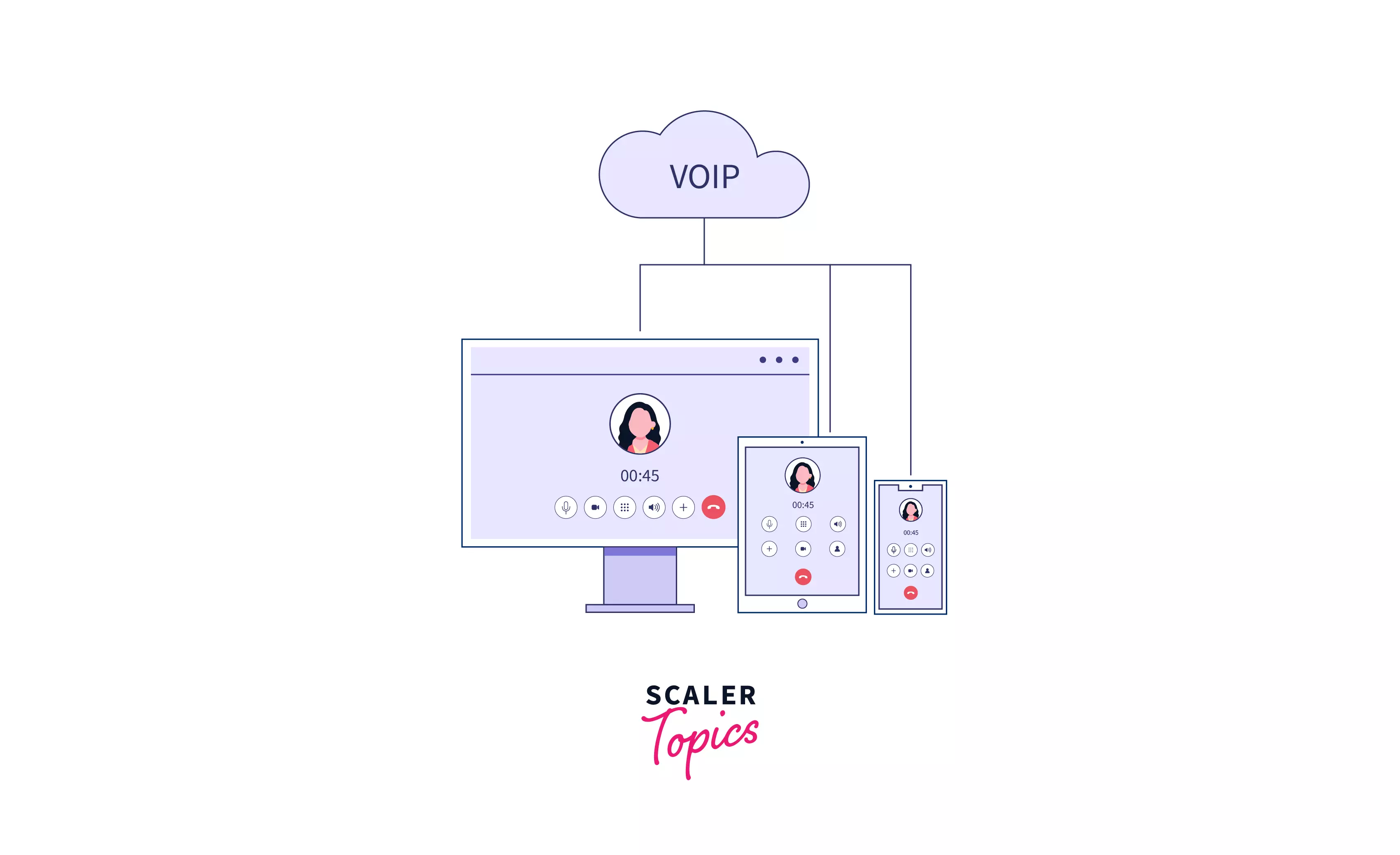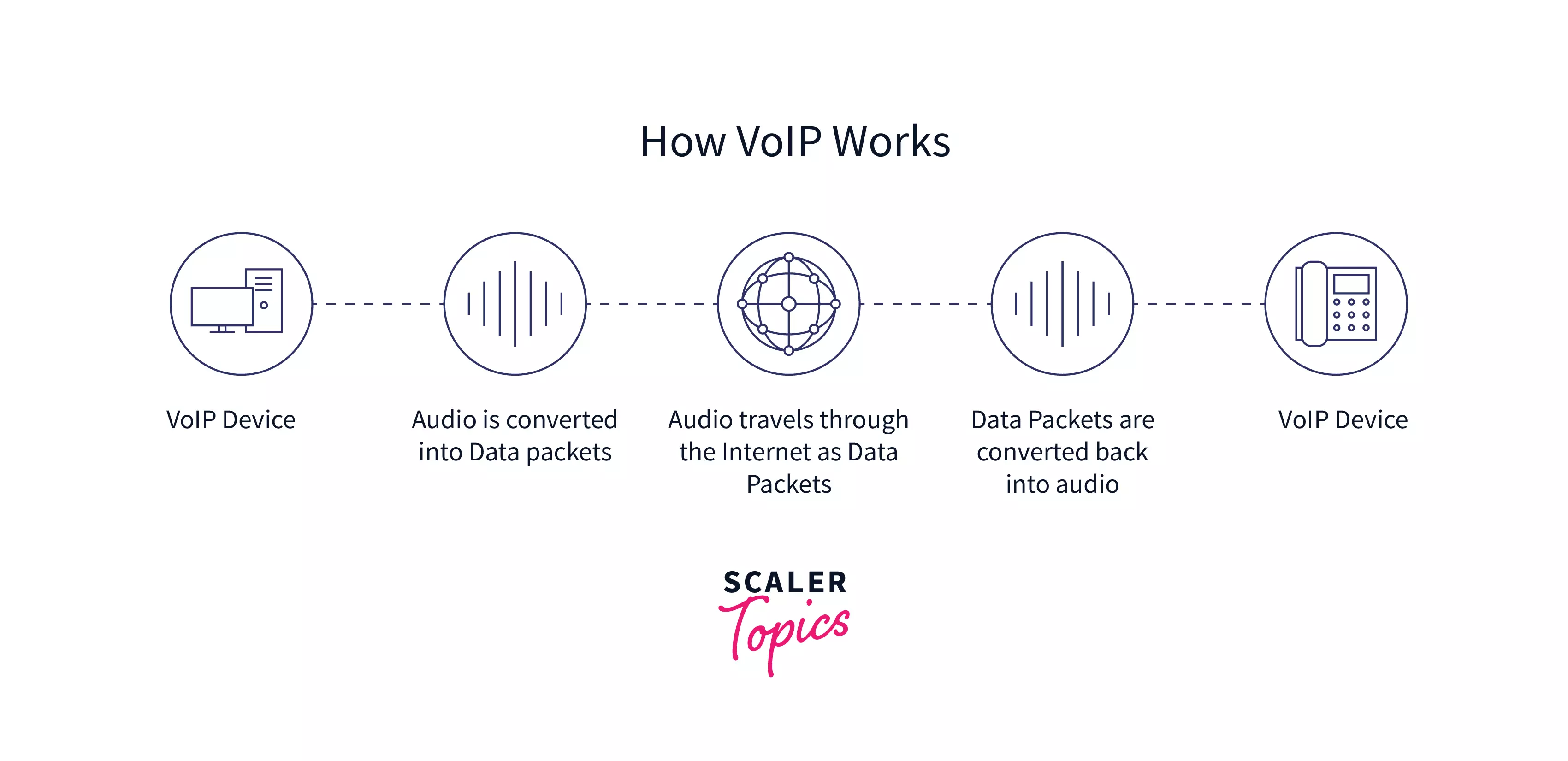Voice Over IP | VOIP
Overview
Voice over Internet Protocol(VoIP) is a way of transmitting voice and multimedia over a network. VoIP enables users to place voice calls via their computer, smartphone, other mobile devices, dedicated VoIP phones, and WebRTC-capable browsers. VoIP is a technology that benefits consumers and businesses because it typically includes features not available on traditional phone services. These additional features may include call recording, custom caller ID, and voicemail to e-mail.
What is Voice Over IP (VoIP)?
Voice over Internet Protocol is a technology that enables you to place voice calls using a broadband Internet connection rather than an analog (traditional) phone line. A VoIP service converts a user's voice from audio signals to digital data, which is then transmitted over the internet. If any other user calls from a regular phone number, the signal is transformed back to a standard telephone signal before reaching that user.

Traditionally, conventional phone systems transmit voice signals over analog phone lines, necessitating the installation of circuit wiring to make and receive calls. In this case, a specialized piece of hardware known as a Private Branch Exchange (PBX) is used to connect internal phone extensions to the public telephone network. The VoIP changed the telecommunications industry by simplifying the complexities, making traditional phone lines and services nearly obsolete, and reducing demand for them significantly.
How does Voice over Internet Protocol Work?
VoIP enables you to place calls whenever you want, from any location, without using a landline or mobile network. It aids in increasing productivity and collaboration. It converts our analog voice signals into digital signals (data packets). This packet is routed through both the public and private internet protocol networks. To ensure acceptable voice quality, enterprise or private networks typically use quality of service (QoS) to prioritize voice traffic over non-latency-sensitive applications. With the help of this VoIP packet, you may make both computer-to-computer and landline calls, as well as use computer microphones and headsets to communicate.

A VoIP service provider offers superior services compared to traditional landlines. Your data is saved in the cloud using VoIP because it uses the internet. Additionally, it employs an online dashboard that enables customers to manage VoIP systems, call forwarding, contacts, and corporate phone calls.
Equipments Required for Voice over IP
A computer, a fast internet connection (broadband connection), VoIP software, and fiber optic are the main requirements for using VoIP. Let's look at the physical component required to use VoIP service.
- Equipment required for VoIP with an adapter:- A compatible phone and a VoIP adapter are needed.
- Equipment required for VoIP with a computer:- A desktop, good internet connection, VoIP software, speakers, microphone, and a better headset is needed.
- Requirement for VoIP with a smartphone:- A smartphone and a good internet connection are required.
Features of VoIP
The VoIP provides various attractive features as compared to traditional telephones. Some of these are mentioned below:
Auto-Attendant
A phone menu that answers incoming calls might help you present a professional image. If you've ever called a company's customer care number, you've used an auto attendant and had to press one for sales and two for support. An auto attendant assists you in directing callers to the appropriate person or department. Outside of business hours, you can forward calls to your voicemail or elsewhere.
Mobile and Desktop Apps
It is more important than ever to provide your team with a VoIP solution that allows them to work from home. You can use these apps to make phone calls, join conference calls, send text messages, and more. These communication apps can be used with or without a desk phone. It's entirely up to you.
HD Call Quality
There's almost nothing more irritating than asking callers to repeat themselves. HD Voice improves the audio quality of your phone calls. This VoIP technology enhances the clarity of phone calls by making them twice as clear as a standard phone call. Many VoIP headsets and phones include noise-canceling capabilities for even richer sound.
Unified Communications
VoIP uses the idea of Unified Communications(UC) to enhance team productivity. A company's communications platform is fully integrated using unified communication rather than several disparate apps. Unified communication simplifies and organizes real-time communication. Some of the essential functions within unified communication are:
- Instant messaging
- Team chats
- Video meetings
- Screen sharing
- Conference calling
Call Encryption and VoIP Security
VoIP technologies such as TLS and SRTP scramble call data, making eavesdropping nearly impossible. This makes VoIP safe and secure even if data packets travel through the internet.
Call Recording
Call recording via your phone system indicates areas where your team may improve. It is likewise secure, with only authorized individuals having access to it. One of the main benefits of using VoIP call recording is that it is imperceptible to all parties. Unlike traditional landline PBX systems, it also requires no additional hardware.
Advantages of VoIP
- VoIP allows you to make a call directly from your computer, a VoIP phone, or a traditional phone connected to an adapter.
- VoIP services are reliable and reasonably priced.
- It is possible to avoid paying for both a broadband connection and a traditional phone line.
- VoIP can provide a smoother connection than an analog signal.
- VoIP technology is more secure than traditional phone systems.
- VoIP simplifies using services such as call forwarding, international calls, and business communications.
- VoIP carries both voice and data over a single network.
Disadvantages of VoIP
- It is necessary to have a high-speed internet connection. Otherwise, low internet speed causes degradation in the call quality.
- The VoIP service providers do not offer the power backup feature.
- Not all VoIP services connect to emergency services directly via emergency service numbers.
- During power outages, services will be unavailable.
Conclusion
- Voice over Internet Protocol(VoIP) is a way of transmitting voice and multimedia over a network.
- A VoIP service converts a user's voice from audio signals to digital data, which is then transmitted over the internet.
- Some of the features provided by VoIP are:
- Auto-Attendant.
- Mobile and Desktop Apps.
- HD call quality.
- Unified Communications.
- Call encryption and VoIP security.
- Call Recording.
- To ensure acceptable voice quality, enterprise or private networks typically use quality of service (QoS) to prioritize voice traffic over non-latency-sensitive applications.
- VoIP is capable of carrying both voice and data over a single network.
